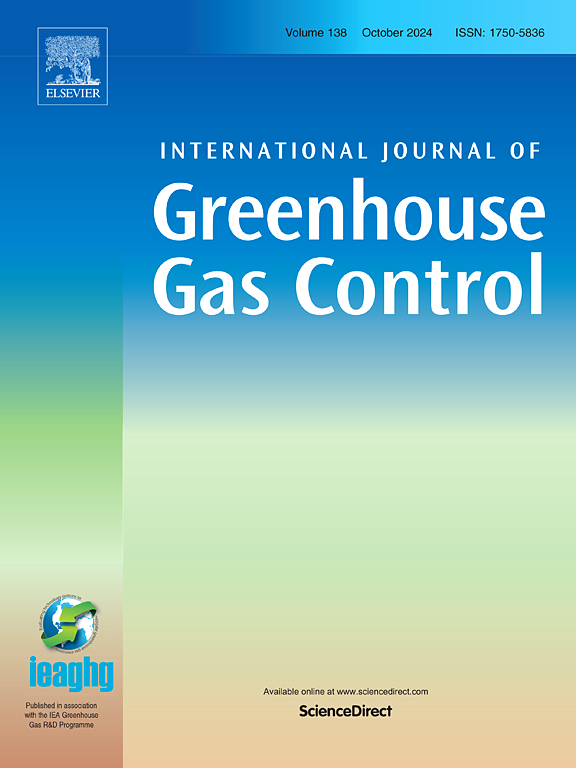Critical review and recommendations for strengthening health and safety and major accident prevention regulations for carbon capture and storage in UK ports
IF 5.2
3区 工程技术
Q2 ENERGY & FUELS
International Journal of Greenhouse Gas Control
Pub Date : 2025-10-01
DOI:10.1016/j.ijggc.2025.104479
引用次数: 0
Abstract
Carbon Capture and Storage (CCS) is an essential component of the UK Government’s net-zero strategy. Policies emphasize the need for flexible and accessible CO₂ transport and storage networks, with shipping emerging as a key non-pipeline transport modality to connect industrial clusters to offshore storage. In this article, we assess whether current health and safety and major accident prevention regulations adequately govern the risks posed by expanding CO₂ handling and storage in UK ports to support CCS deployment.
Our analysis identifies three regulatory gaps. First, while the Port Marine Safety Code addresses regulatory complexity in UK ports through establishing uniform national standards for marine safety, it cannot regulate the emerging risks of anticipated large-scale CO₂ shipping activities without clear performance standards in specific legislation. Second, duly appointed harbor masters must be well-informed to effectively exercise the powers granted under the Dangerous Goods in Harbour Areas Regulations (DGHAR) to reduce serious accident risks associated with increased CO₂ shipping. Third, the Control of Major Accident Hazards Regulations (COMAH) currently exclude temporary CO₂ storage and do not include CO₂ within their scope, limiting their effectiveness for major accident prevention in port storage scenarios.
To address these gaps, we recommend issuing tailored guidance under DGHAR to clarify risk management responsibilities for CO₂ shipping and amending COMAH to include CO₂ storage and recognize CO₂ as a dangerous substance. These reforms are essential to protect port communities, ensure robust risk management, and support the safe, sustainable expansion of CO₂ shipping as a critical enabler of CCS.
就加强英国港口碳捕集和封存的健康与安全及重大事故预防条例进行重要审查并提出建议
碳捕集与封存(CCS)是英国政府净零排放战略的重要组成部分。政策强调需要灵活和可访问的二氧化碳运输和储存网络,航运正在成为连接产业集群和海上储存的关键非管道运输方式。在本文中,我们评估了当前的健康和安全和重大事故预防法规是否充分管理了英国港口扩大二氧化碳处理和储存以支持CCS部署所带来的风险。我们的分析确定了三个监管缺口。首先,虽然《港口海上安全法》通过建立统一的国家海上安全标准来解决英国港口监管的复杂性,但如果没有明确的具体立法标准,它就无法规范预期的大规模CO₂运输活动的新风险。其次,正式任命的港务长必须充分了解情况,才能有效行使《港区危险货物规例》赋予的权力,以减少因二氧化碳运输增加而导致的严重事故风险。第三,目前的《重大事故危险控制条例》(COMAH)不包括临时CO₂储存,也不包括CO₂,限制了其在港口储存情况下预防重大事故的效果。为了解决这些差距,我们建议在DGHAR下发布量身定制的指南,以明确二氧化碳运输的风险管理责任,并修订COMAH,将二氧化碳储存纳入其中,并将二氧化碳视为危险物质。这些改革对于保护港口社区,确保强有力的风险管理,并支持二氧化碳航运的安全、可持续发展至关重要,这是CCS的关键推动者。
本文章由计算机程序翻译,如有差异,请以英文原文为准。
求助全文
约1分钟内获得全文
求助全文
来源期刊
CiteScore
9.20
自引率
10.30%
发文量
199
审稿时长
4.8 months
期刊介绍:
The International Journal of Greenhouse Gas Control is a peer reviewed journal focusing on scientific and engineering developments in greenhouse gas control through capture and storage at large stationary emitters in the power sector and in other major resource, manufacturing and production industries. The Journal covers all greenhouse gas emissions within the power and industrial sectors, and comprises both technical and non-technical related literature in one volume. Original research, review and comments papers are included.

 求助内容:
求助内容: 应助结果提醒方式:
应助结果提醒方式:


